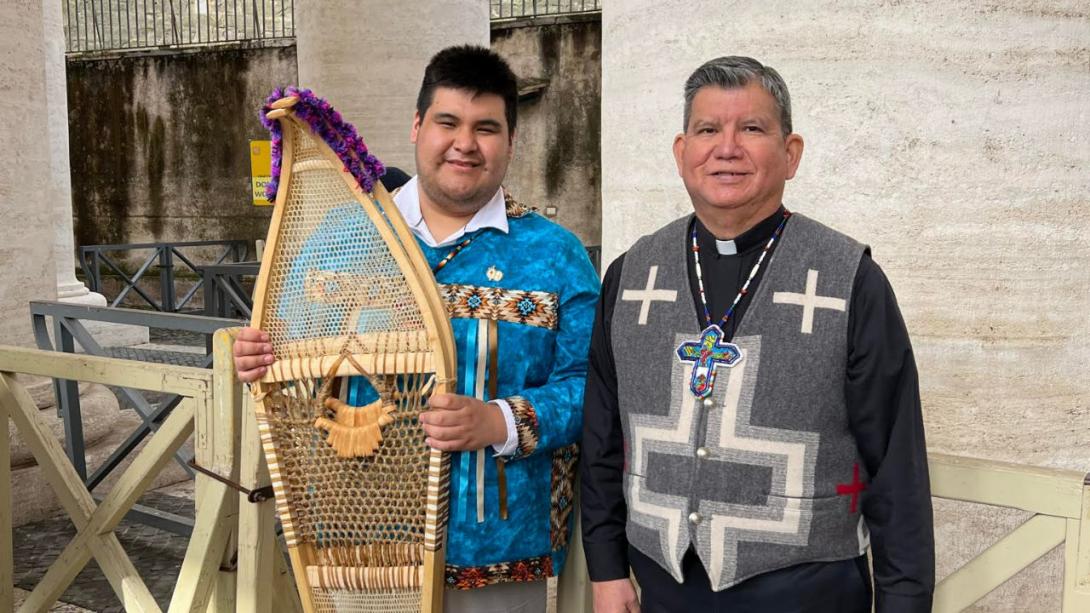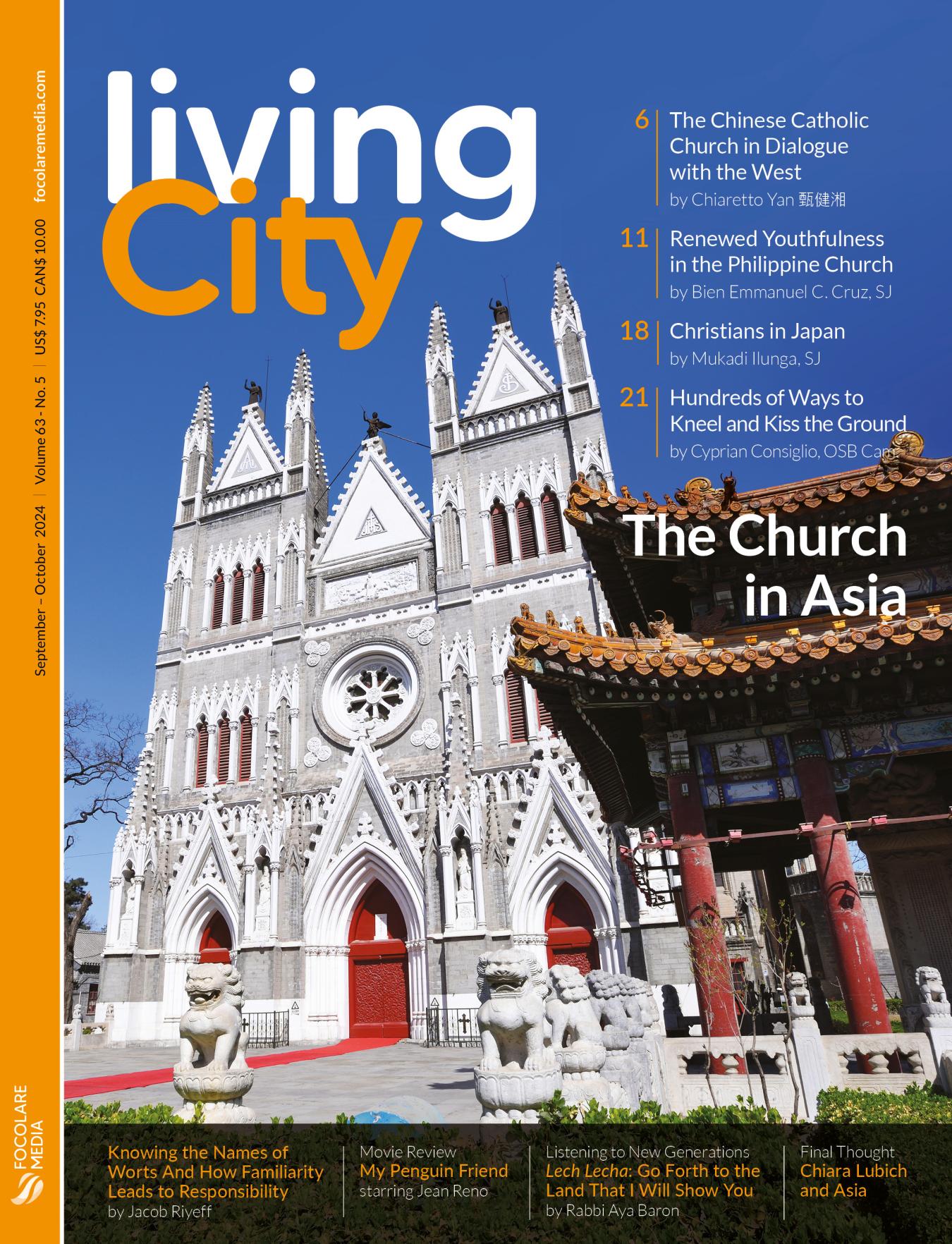An Indigenous priest working at the process of healing through faith for his people and
beyond.

Photo courtesy of Fr. Maurice Henry Sands
The trip of Pope Francis to Canada in July 2022—one that he called “a journey from failure to hope”—is still vivid in our memory as another step along the lengthy pathway toward healing and reconciliation.
Fr. Maurice Henry Sands was born and raised in the unceded territory of Walpole Island in southwestern Ontario, Canada, at the mouth of the St. Clair River. The territory, also known as Bkejwanong (meaning “Where the waters divide”), straddles the U.S.-Canada border and is inhabited by Ojibway, Odawa and Potawatomi.
Fr. Sands, whose large extended family—brothers, sisters, cousins, nephews, nieces—still resides there would have his own compelling story to tell of the pain and alienation suffered by his ancestors, his family, and himself.
His story and his work today reflect a new hope born from the suffering of the past. “Often when visiting the city close to the reservation I was discriminated against for being Indian,” Fr. Sands shared. “I couldn’t frequent certain stores or theaters. Instead of a birth certificate, I hold a statement that reads: ‘birth of an Indian.’ My family was directly impacted by the cultural assimilation policies of Native Americans with my grandparents being removed from their families at a very young age and put into residential schools, where they suffered abuse and alienation. They met in one of these schools, married, and went on to have ten children. Unfortunately my grandparents died young and at the age of fifteen, my mother assumed the care of her many siblings until they were removed by the government and placed into foster care.”
A witness of Gospel life
He was deeply influenced by his mother who was a significant source of light and strength, especially when discerning his own vocation.
“Although my mother endured a life of considerable suffering, she never wavered from her strong faith in Christ. She deeply believed in obeying the Commandments, in loving the Lord and our neighbor as he invites us to do. She was a great role model, helping those around her in so many ways. The witness she gave to the life of the Gospel and its message of hope inspired me to become a priest and to leave behind my promising career in investment banking.”
He was ordained in 2005 in the Archdiocese of Detroit and since 2015 has headed the Black and Indian Mission Office of the USCCB. The office is a merge of three formerly distinct organizations: the Catholic Negro American Mission Board, established in 1907, which joined the Bureau of Catholic Indian Missions and the Commission for the Catholic Missions among the Colored People.
The power of his story
Besides raising funds for evangelization programs, ministry programs, and schools, and being an advocate with the Church and the Federal Government, Fr. Sands looks for opportunities to support good pastoral care in parishes and missions. “Each group, be it Black or Native American Catholics, have their own challenges in ministering to those being drawn away from the Church, whether it be a result of secularism, racism, or cultural issues,” he says. He is constantly looking for teachers and trained lay persons from the African American or Native American community to proclaim the Gospel.
“I often share my story, especially with young people, telling them that it is possible to have a good, successful life even though one has experienced discrimination and racism,” he shares. “It’s challenging to live with prejudice and hatred, rooted in all the negative messages we have received; but Christ has made a difference in my life. I know my dignity and worth is found in him and the love, truth and wisdom that he makes available to us.” This has allowed him to go beyond the negative experiences of doors being closed to him, holding him back from dreams and aspirations.
Bringing new hope
In Fr. Sands’ opinion, Native Americans need hope more than anything. “A lack of hope is the root cause of the high rates of alcoholism, drug use and suicide experienced by Native people,” he says. “My mother was the person who taught me about Christian hope; how to overcome serious trials and sufferings and still believe that we could be better, that the world around us could be better. The hope that she has instilled in me, that she lived with heroic sacrifice, has enabled me to overcome the historical trauma, the obstacles, and untruths that have been part of my journey as a Native American.”
Is there anything that other Catholic communities could learn from Native Americans? “The profound sense of family and community, the respect we give to our elders, the reverence for all of creation,” is his answer.
Generally, he sees that there are more efforts to turn away from the Eurocentric Church of the past since Vatican II and to emphasize the gifts that different cultures bring to the Church. “More people have made known the importance in Catholic life and liturgy of the many multi-cultural expressions, music and art forms that exist in our society. The Dicastery of Divine Worship in Rome and other dicasteries, as well as the different dioceses and the National Conferences of Bishops are encouraging people of all ethnic backgrounds to bring more their culture, traditions and artistic expressions into the life of the Church.”
A new start
Fr. Sands accompanied the delegation of different tribes of Indigenous Peoples in North America to Rome for a meeting with Pope Francis at the end of March 2022. “I was very impressed when the Pope received us. It was very apparent that the injustices we faced matter to him; that we matter to him. He feels very sorry and offers himself in the best way he can to fulfil this huge responsibility that has been given to him.”
He felt that the pope is bringing Christ’s love and compassion to those who need it. “The fruits of everything he has done will take time to ripen. Changes take time to be apparent and to have an impact on people’s lives.”
The most important aspect was and is forgiveness: “Native Americans have been subjected to extreme injustices, both individually and collectively, that have been so very damaging, so very systematic and so long-lasting. However, an unwillingness or inability to forgive has a very negative impact on individuals, families, communities, and society as a whole; it makes us prisoners of anger, bitterness and resentment.”
Forgiveness though, has to be a free decision that can never be demanded or expected. Fr. Sands believes that Christ’s teachings have been given to us precisely because “he knows that forgiveness goes against our human nature. He alone can change our hearts so that we can experience the freedom, peace, and loving relationships with one another that true forgiveness can give us.”











